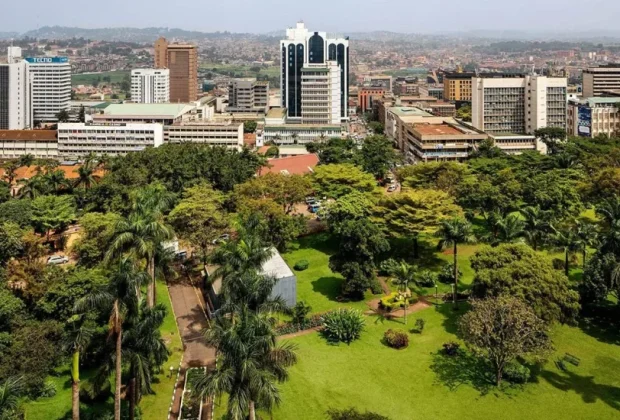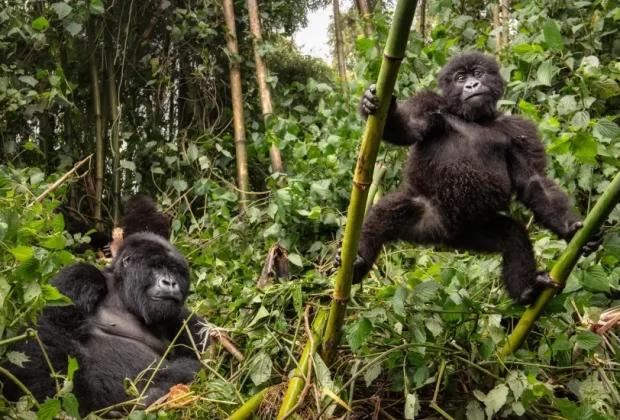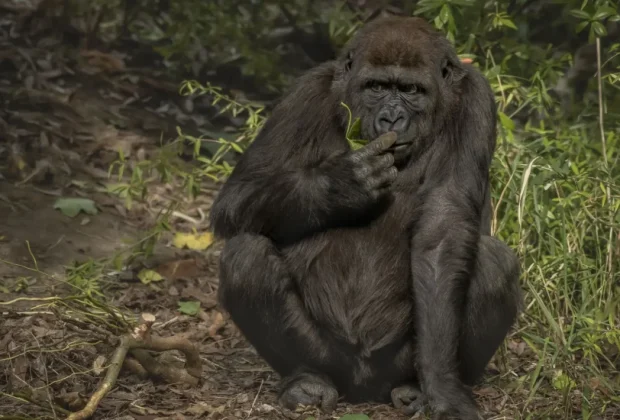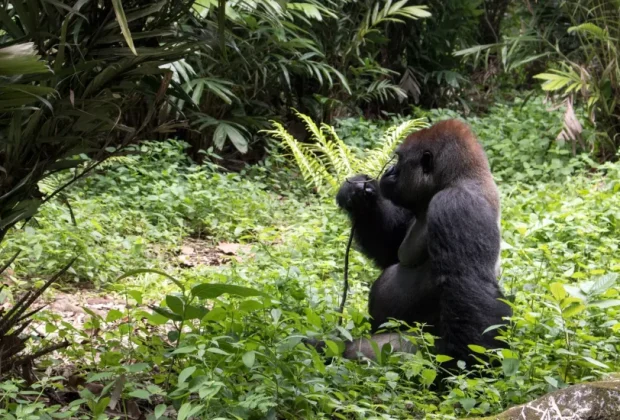9 Days Ultimate Gorilla and Primate Safari




Embark on a 12-day adventure that combines the excitement of an African safari with the relaxation of Zanzibar’s pristine beaches. Explore Tanzania’s iconic national parks, encountering the Big Five and breathtaking landscapes. Then, unwind on the shores of Zanzibar, exploring historic Stone Town and indulging in island delights. With expert guides and luxurious accommodations, this journey promises an unforgettable fusion of wildlife, culture, and relaxation. Get ready for the ultimate safari and beach getaway!
Upon arrival at Entebbe International Airport, you will be received by a member of our team, for your transfer to a pre-arranged hotel in Kampala City. Arrive at the hotel and spend the rest of the day at leisure.
After an early breakfast, head to the park headquarters for briefing. Briefing starts at 8:00 am.
Tracking is a captivating and unforgettable experience which more than repays the effort needed to reach Bwindi. Gorilla tracking starts at 8:30 am and can last a few hours to a whole day depending on where the gorillas were left the previous day.
Rest of the day at leisure.
At 795 sq.km, this is home to over 351 tree species some over 200 years old, famous for 13 primate species including Chimpanzees, 70 mammal species & over 375 bird species. In the morning, the start of the day with breakfast and get ready for the day’s exciting activities.
First thing, you will go for chimpanzee tracking combined with an all green forest walk where you will see various bird species (great blue turaco), and more primates like the black and white colobus monkey, you will also view more animals to include bushbucks and mongoose.
Right after this activity, return to your lodge for refreshment and stay at leisure while enjoying your lunch. In the afternoon, visit Bigodi Community where you will be interacting freely with the locals. Then proceed to Bigodi Wetland Sanctuary, a nice spot for birds; to include; African hobby, great blue turaco, Black kite, Swamp flycatcher, Scarlet-chested bird, Grey-crowned crane, Herons, Weaver birds and many more. Later on, in the evening, you will return to your lodge and enjoy your evening.
Queen Elizabeth National Park is famous for diverse ecosystems which include sprawling savannah, shady humid forests, sparkling lakes, wetlands, and amazing craters. Ideal for the big game, primate species to include Chimps and over 600 bird species. It has superb scenic views of Kazinga Channel, the Rwenzori Mountains and crater lakes which are home to a wide variety of birds.
After your breakfast enjoy a leisurely morning, and later on start off your journey to ‘’a medley of wonders’’. On arrival after a stopover at the equator, you will check into your lodge for lunch, refreshment and leisure.
In the evening go for a Dusk Game Drive; experience the various animals towards the night time to include bushbucks, elephants, warthogs, hippos and more. Thereafter, return to your lodge for a dinner under and after, you may join a campfire and storytelling.
Start off the day with a tasty breakfast and then get deeper into the highlights of this amazing park.
Dawn Game Drive: explore the park’s flora and fauna to include elusive bird species and a wide variety of animals like elephants, buffaloes, hippos, impalas, waterbucks, Kobs, warthogs and many more. Don’t miss out the scenic views of the crater lakes like Nyamunuka which is medicinal to the animals.
Katwe Community: discover the people and their culture where you will learn about salt mining by the local means from Lake Katwe and interact with the local people and share cultural experiences. After here, return to your lodge for lunch and leisure in preparations for the afternoon activities.
Launch cruise: this is the main activity after lunch where you will spot a number of birds like; the African fish eagle, pelicans, flamingos, Hammerkop, egrets, the African finfoot, pied kingfishers, marabou storks, vultures, kites and many more, together with animals like hippos, buffalos, warthogs, crocodiles, waterbucks and more as most of them visit to water and cool off. This boat cruise is spiced up with stunning views of the Mweya peninsular and a local fishing village along the lake shores. Visit Mweya Museum; after the boat cruise, with this visit, you will learn more about the parks history, animals, physical features (crater lakes formation) together with the parks future prospects. After the day’s activities, you will return to your lodge and enjoy sundowner leisure.
After breakfast and a leisurely morning, you will have a transfer to Bwindi Impenetrable National Park through the Southerly Ishasha Sector, this will offer you a chance to see the tree climbing lions as this is the only place where can be found. On arrival, check into your lodge and recuperate from the journey.
At 331 sq.km, Bwindi Impenetrable National Park is home to half the world’s mountain gorillas, over 346 bird species, 202 butterfly species, 400 plant species, 63 tree species, 120 mammal species & 27 frog species. Here is the chance to meet and interact with the shortest people (Batwa) of the mountains.
After an early breakfast, head to the park headquarters for briefing at exactly 8:00 am and the tracking will commence in the next 30 minutes after registration and briefing by the ranger guides.
Gorilla tracking is a very captivating and unforgettable experience which more than repays the effort needed to reach Bwindi. This starts at 8:30 am and can last a few hours to a whole day depending on where the gorillas were left the previous day. After gorilla tracking, return to your lodge and have your lunch.
In the evening you may opt for a community tour where you will meet and interact with the shortest people (Batwa) of the mountains; learn about their way of life such as; hunting skills, medicinal knowledge, child upbringing, cuisines, art and crafts, and many more interesting aspects.
After an early breakfast, depart Bwindi for Kampala. You will have lunch stop-over in Mbarara, then proceed to Masaka and your next stopover will be at the equator; for a photo opportunity. After this equator moment, proceed to Kampala city and upon arrival check into your hotel and spend the rest of the day at leisure.
Today you will have a half day tour of Kampala city and souvenir shopping.
Thereafter, you will be transferred to the airport for your outbound flight back home.
Activities/services included in the cost:
- Accommodation as per the itinerary
Lodges on Full Board - Road transportation in 4wd land Cruiser safari vehicle
Game drives as per the itinerary - Park entrance fees and crater service fees
- English Speaking guides available for the safari
- Accommodation as per the itinerary
Activities/services excluded in the cost:
- Visit to Masai Cultural Village
- All International Flights/local Flights + Taxes
- Visa fees, Travel & Personal accident insurance
- Excursions, services and activities not mentioned in this program
- Personal expenses e.g. laundry, telephone calls, Drinks, Tips and gratuities
Passenger Information
- Passengers should bring only duffle bags safaris{not suitcases}
- All the passengers must have Identification Card/Passport with them for internal flights.
- Baggage on domestic flights is strictly limited to 15kgs per person (including hand luggage). Any excess baggage will be charged by the airline at check-in.
- Passengers arriving to Tanzania may be asked to present a valid Yellow Fever Vaccination Certificate
- Tourist Visa will be obtained at the entry points, but it is advisable to double check before travelling to Tanzania.
What is the best time of year to go on a safari in Tanzania? The best time for a safari in Tanzania depends on your preferences. The dry season (June to October) is ideal for wildlife viewing as animals gather around water sources, but it’s also the busiest time. The wet season (November to May) offers lush landscapes and fewer tourists, but wildlife may be harder to spot due to thick vegetation.
What should I pack for a safari in Tanzania? Essential items include lightweight and neutral-colored clothing, sturdy walking shoes, a wide-brimmed hat, sunscreen, insect repellent, binoculars, a camera with extra batteries and memory cards, and any necessary medications. It’s also advisable to pack layers as temperatures can vary throughout the day.
Do I need a visa for Tanzania? Most visitors to Tanzania require a visa, which can be obtained upon arrival at the airport or purchased online in advance. Visa requirements vary depending on your nationality, so it’s important to check the latest information before traveling.
Is it safe to go on a safari in Tanzania? Tanzania is generally safe for tourists, including safaris, but it’s important to take standard precautions such as staying updated on travel advisories, avoiding isolated areas at night, and following the guidance of your tour guides.
What types of accommodations are available on safari? Accommodation options range from luxury lodges and tented camps to budget-friendly campsites. Luxury lodges typically offer comfortable amenities such as en-suite bathrooms, gourmet meals, and swimming pools, while tented camps provide a more authentic safari experience with canvas tents and communal dining areas.
What wildlife can I expect to see on safari in Tanzania? Tanzania is home to a diverse array of wildlife, including the Big Five (lion, elephant, buffalo, rhino, and leopard), as well as cheetahs, giraffes, zebras, wildebeests, hippos, crocodiles, and a variety of bird species. The specific animals you’ll encounter will depend on the location and time of year.
Are safaris suitable for children? Many safari operators offer family-friendly safari options, including accommodations with family rooms, shorter game drives, and child-friendly activities. However, it’s important to consider the age and interests of your children when planning a safari and to choose activities that are suitable for them.
What is the typical duration of a safari in Tanzania? Safari durations can vary depending on your preferences and itinerary. Most safaris range from a few days to a week or more, with shorter safaris focusing on specific national parks or wildlife areas and longer safaris covering multiple destinations. Customized itineraries are also available to suit individual preferences and schedules.
